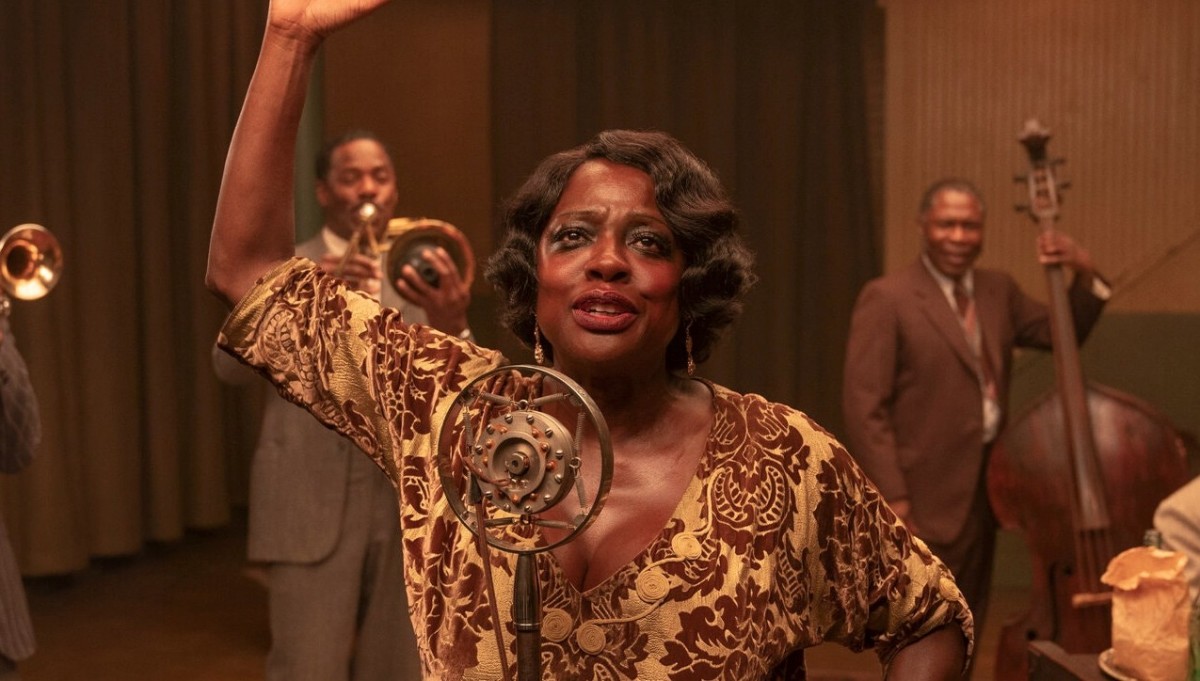Awards queens the world over were predicting that a shameful, persistent curse would be broken last weekend—namely that, at long last, a woman of color would win the Best Actress Oscar for only the second time in the 93-year history of the Academy Awards. Not since Halle Berry’s historic first for winning the top prize for her performance in Monster’s Ball (2001) had a Black woman been so heavily favored to win in this category, and odds-makers were seemingly aligned in their prediction for Viola Davis’ lauded, Screen Actors’ Guild-rewarded turn as “Mother of the Blues” Ma Rainey (in Netflix’s Ma Rainey’s Black Bottom). In a hotly-contested race, Andra Day was also touted by many to be the spoiler who might shock with a win for playing the titular legend in Hulu’s The United States vs. Billie Holiday. Not since 1972 had two Black women even been nominated together in this category, and the prevailing narrative was “fucking finally.” Even more exciting was the fact that Davis and Day were playing queer Black women, whose sexualities were intrinsic to their stories.
Instead, a relative upset: Nomadland’s Frances McDormand won her third Academy Award for Best Actress (after triumphs for 1996’s Fargo and 2017’s Three Billboards Outside Ebbing, Missouri).
Could it be the films’ streaming distributors didn’t use their unlimited awards slush funds to properly position their contenders in the firmament? Could it be the obvious #AMPASsowhite pattern that has produced only one Black woman winning in its entire history? Perhaps. But it is perhaps also telling to track how queer female characters rank over the course of this history as well: a total of 10 women playing queer roles have been nominated since the Academy’s first curation of this category in 1927-28.* Two have won the Best Actress Oscar. Isn’t it reasonable to inquire what’s up with AMPAS’ beef with queer women? Let’s take a fresh look at the exceptions who slipped through AMPAS’ ostensible bigot paws!
*For the purposes of this conversation, we’re looking at characters whose queer sensibility is directly addressed in some way, which excludes nominated performances like Whoopi Goldberg in The Color Purple, Natalie Portman in Black Swan, and Oscar winner Nicole Kidman in The Hours.
Bette Midler – The Rose (1979, Mark Rydell)
Leave it to Midler to be the first woman to be nominated for playing a queer female character, a blistering riff on famously bisexual Janis Joplin. Although The Rose focuses mostly on its central character’s Shakespearean thirst for a dashing man, it also includes a delicate moment that disrupts their bliss. Rose is caught in a romantic clinch with a female lover, much to her beau’s dudebro revulsion. These scenes deal directly with her internal conflict with her own sexual expression, giving Midler a chance to deepen her flashy and boisterous character by revealing this secret, hidden, horny shame that torments her.
Salma Hayek – Frida (2002, Julie Taymor)
Artist Frida Kahlo’s bisexuality was well-known and well-reported, so when Hayek’s take on the character included a few of these lusty moments shared with other women, it was neither a shock nor incendiary. However, in terms of the film’s focus on Kahlo’s romantic life, her wild sexual passions were kept on deck while her romance with Diego Rivera was the main fare. The film’s handling of her complex sexual hunger was limp overall, if you please. The fact that this film refuses inspiration from Kahlo’s famous libido remains a major puzzle and a missed opportunity.
Charlize Theron – Monster (2003 – Patty Jenkins)
The first queer female character to win an Oscar for Best Actress, I’m unsure if even sex worker Aileen Wuornos herself would define her sexuality as “queer” or “lesbian.” We could ask if the State of Florida hadn’t already put her to death. Even as Monster does a provocative, if at times vague, examination of her main relationship with another woman (played with busty, witless enthusiasm by Christiana Ricci) on the eve of her arrest and subsequent incarceration, Theron’s bravura performance homes in on Aileen’s violent traumas rather than developing her romance and sexuality.
Judi Dench – Notes on a Scandal (2006, Richard Eyre)
“This last month has been the most delicious time of my life. Of course we have had our ups and downs. The pressure is intense when two women share their lives. But, oh, but what marvelous intensity it is!” As endlessly quotable as Dench’s foray into Sapphic camp is, ultimately her pervy Barbara Covett is just another grotesque stereotype of a predatory, conniving queer villain interfering in the life of bored, needy teacher Sheba Hart (Cate Blanchett), who is neither LGBT nor romantically interested in Barbara.
Annette Bening – The Kids are Alright (2010, Lisa Cholodenko)
On paper, Dr. Nic Allgood might have the most appeal for AMPAS voters: a professional, married, skilled mother and partner navigating real soccer mom issues that are easy for us bourgeoisie to identify with. Nic is definitely the most well-rounded and balanced queer female character on the list, despite her functioning alcoholism and her marriage on the verge (propelled by her wife’s experimental dalliances with heterosex). The film ends on an optimistic enough note that viewers walk away believing Nic and Jules will be OK and continue to live their Sherman Oaks Pottery Barn lesbian fantasy.
Cate Blanchett – Carol (2015, Todd Haynes)
Although Carol is arguably the most romantic of all of the roles nominated for Best Actress, Blanchett’s character is still, to wit, a deeply closeted and ashamed woman married to a man. She is ready to leave it all behind for the love and affection of Rooney Mara’s bright, buttoned-up shopgirl, but their love story, set in the 1950s, doesn’t have a fairytale ending, which is to say, it’s a bummer.
Olivia Colman – The Favorite (2018, Yorgos Lanthimos)
The second queer character in the history of the Academy Awards, Queen Anne is closeted and ashamed, easily reachable through her lascivious sexual appetites, and yet there are so many alternately tender and raw moments that are cutting and moving as they convey her private life. Ultimately, the Queen is lonely, and chooses to rule rather than to love. Queerness is essential to the way this story is told, but, elusively, not what defines it or its characters.
Melissa McCarthy – Can You Ever Forgive Me? (2018, Marielle Heller)
Certainly the funniest out of the bunch, McCarthy played one of the only “out” lesbians on the list. As a down-on-her-luck alcoholic sad sack author who turns to forgery to pay the bills, the actor creates a deeply-flawed, sexless, often unsympathetic, yet still brilliantly multidimensional queer woman.
Viola Davis – Ma Rainey’s Black Bottom & Andra Day The United States vs. Billie Holiday (2020-2021, George C. Wolfe/Lee Daniels)
Davis and Day only skim the surfaces of their characters’ sexuality, and the depictions of their sexual lives feels neglected and inadequate. Whereas Mo’nique as Ma Rainey in Dee Rees’ Bessie was lusty and joyous in her trysts with women and Diana Ross as Billie in Lady Sings the Blues skipped over her character’s bisexuality altogether, Davis and Day seem to end up with sexuality-as-footnotes, or worse, as titillating, perfunctory stunts that move their stories exactly nowhere.
Looking through this short list of cisgender, heterosexual, mostly white women who have been singled out for their work as queer women, a pattern emerges: each of these characters is tragic. There has yet to be a cinematic portrayal of a queer woman represented in the Best Actress category that could be considered an unspoiled hero, or really even considered anything other than a well-adjusted suburbanite. What this collated list reveals as fishy lies not with the performances, or even solely with AMPAS voters themselves, but with a snowballing pattern of constrained representation hostile to queer women who aren’t miserable.
If we are focusing just on these ten nominated women, AMPAS might be said to conceive of queer women as solely troubled, creepy and/or doomed. Which, curiously, sounds a lot like the misogyny endemic to gay male segregationists challenged by the rest of the LGBTQ+ community. (Not that including The Color Purple, Black Swan, or The Hours would help.) Seemingly easy fix: funding and making more dynamic representations of queer women in film can only yank Academy in the right direction. Only one of the above ten films, The Kids are Alright, was even directed by an out, queer filmmaker. Perhaps giving dykes like Lisa Cholodenko more opportunities would be a good start.




